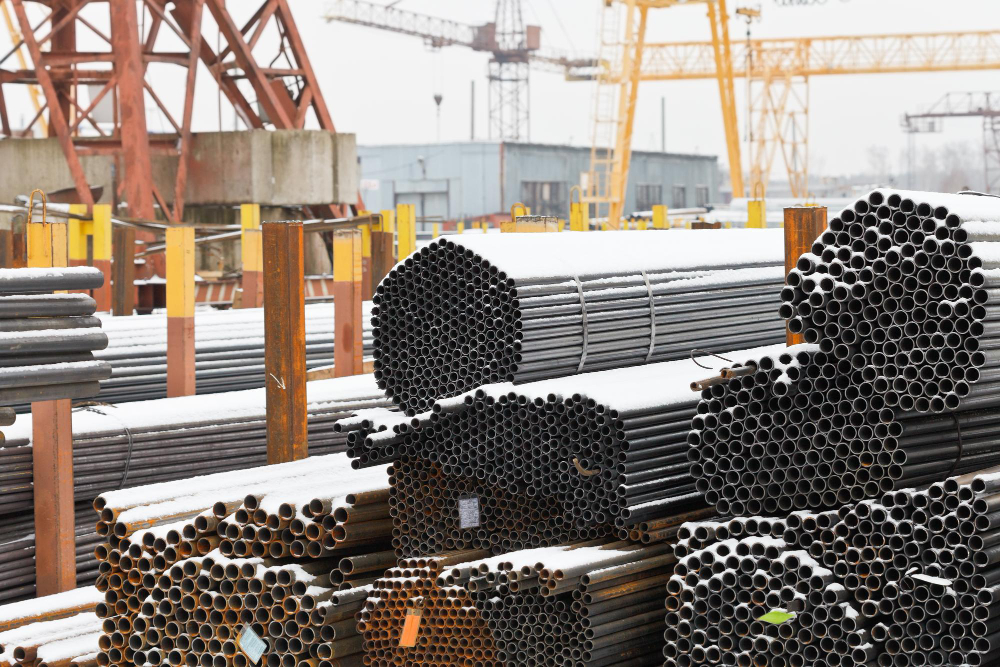In the ever-evolving landscape of the oil and gas industry, a component that plays a pivotal role yet often goes unnoticed is steel pipes. These unsung heroes are the lifelines that connect oil and gas reservoirs to processing facilities and distribution networks. Find out the significance of steel pipes in the oil and gas business, their various applications, and their advantages. We will also discuss the different steel pipes for construction, and the types used, including seamless, ERW, and LSAW pipes.
Steel Pipe In Oil & Gas Business
Steel pipes are the backbone of the oil and gas industry. They primarily transport petroleum products and natural gas from the extraction sites to refineries, processing plants, and distribution points. The reasons for their prominence are manifold:
- Durability and Strength: Steel pipes are known for their exceptional durability and strength. They can withstand extreme conditions, including high pressure and temperature, making them ideal for the harsh environments often encountered in the oil and gas sector.
- Corrosion Resistance: In the oil and gas industry, pipelines come into contact with corrosive substances. Steel pipes, especially those coated with protective layers, exhibit excellent corrosion resistance, ensuring the integrity of the transport system.
- Cost-Effectiveness: Steel pipes offer a cost-effective solution for transporting large volumes of oil and gas over long distances. Their low maintenance requirements and long lifespan make them an economically viable choice.
- Versatility: Steel pipes can be customized to meet specific project requirements. They are available in various sizes and thicknesses to accommodate different flow rates and pressures.

Steel Pipe Applications And Advantages
The applications of steel pipes for construction or in the oil and gas industry are diverse and essential:
- Oil and Gas Transportation: Steel pipes are primarily used to transport crude oil and natural gas. They connect oil wells, gas reservoirs, and offshore platforms to processing facilities, ensuring a seamless flow of these valuable resources.
- Pipeline Infrastructure: The construction of pipeline networks is critical to the oil and gas business. Steel pipes provide the necessary infrastructure to efficiently transport petroleum products to distant markets.
- Drilling Operations: Steel pipes for construction are also employed in drilling operations. They serve as casings and drill pipes, providing stability to the wellbore during drilling and protecting it from collapsing.
- Refineries and Processing Plants: Steel pipes transport various hydrocarbon products and byproducts within refineries and processing plants. They are integral to the refining and petrochemical processes.
Advantages Add-Ons For Steel Pipe:
- Reliability: Steel pipes are known for their reliability, ensuring the uninterrupted flow of oil and gas.
- Safety: They are fire-resistant, adding an extra layer of safety in accidents.
- Low Friction: Steel pipes have low friction, which minimizes energy loss during transportation.
- Environmental Sustainability: Steel is recyclable, making it an eco-friendly pipeline choice.
Steel Pipe For Petroleum And Natural Gas Materials
Certain materials are required to meet specific challenges in specialized applications within the oil and gas industry. Steel pipes used in these scenarios often undergo additional treatments and are made from materials such as:
- Corrosion-Resistant Alloys: In offshore drilling and subsea pipelines, where exposure to seawater and corrosive environments is high, corrosion-resistant alloys are used to ensure long-term performance.
- High-Strength Steel: Deepwater drilling operations demand high-strength steel pipes that can withstand immense pressure at great depths.
- Heat-Resistant Steel: In high-temperature processing units of refineries, heat-resistant steel pipes are employed to handle the extreme heat generated during refining processes.
Steel Pipe Usage- Seamless, ERW, And LSAW Pipes
The choice of steel pipe type depends on the specific requirements of each project:
- Seamless Pipes: Seamless steel pipes are manufactured without any welded seams. They are favored for applications requiring high-pressure and high-temperature resistance, such as in offshore drilling and gas transmission.
- ERW Pipes: Electric Resistance Welded pipes are cost-effective and widely used for midstream applications. They are suitable for transporting oil and gas at moderate pressures.
- LSAW Pipes: Longitudinal Submerged Arc Welded pipes are used for large-diameter pipelines. They offer excellent strength and are often used to construct long-distance pipelines.
Your Trusted Partner For Premium Steel Pipes In Construction
If you’re in the construction industry and demand the utmost quality and reliability for your steel pipe for construction needs, look no further than Bigfoot Pipe & Piling. Our commitment to excellence and a proven track record makes us your trusted partner in building a solid future. Keep the backbone of your projects strong; choose Bigfoot for top-tier steel pipes that stand the test of time. Contact us today to discuss your specific requirements and experience the difference only we can provide. Your next construction endeavor deserves nothing less than the best.
